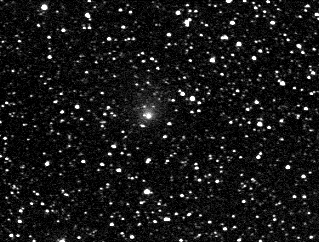
Announcing Comet Hale-Bopp
Credit: Erich Meyer and Herbert Raab, Austria
Discover the cosmos! Each day we feature a different image or photograph of our fascinating universe, along with a brief explanation written by a professional astronomer.
August 20, 1995

Announcing Comet Hale-Bopp
Credit: Erich Meyer and Herbert Raab, Austria
Explanation: The pictured fuzzy patch may become one of the most spectacular comets this century. Although it is very hard to predict how bright a comet will become, Comet Hale-Bopp, named for its discoverers, was spotted farther from the Sun than any previous comet - a good sign that it could become very bright, easily visible to the naked eye. This picture was taken on July 25th 1995, only two days after its discovery. A comet bright enough to see without a telescope occurs only about once a decade. The large coma and long tail of bright comets are so unusual and impressive that they have been considered omens of change by many cultures. A comet does not streak by in few seconds - but it may change its position and structure noticeably from night to night.
Tomorrow's picture: An Orbiting Iceberg

We are proud to acknowledge that an external review by
Point Communications
has rated Astronomy Picture of the Day in the top 5 percent of all
World Wide Web sites.